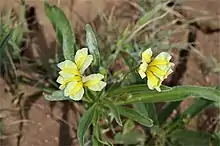Goodenia strangfordii
Goodenia strangfordii, commonly known as wide-leaved goodenia in the Northern Territory,[2] is a species of flowering plant in the family Goodeniaceae and is endemic to northern Australia. It is an erect herb with narrow elliptic to lance-shaped stem leaves with the narrower end towards the base, and racemes of yellow flowers.
| Goodenia strangfordii | |
|---|---|
 | |
| Near Cornish Creek | |
| Scientific classification | |
| Kingdom: | Plantae |
| Clade: | Tracheophytes |
| Clade: | Angiosperms |
| Clade: | Eudicots |
| Clade: | Asterids |
| Order: | Asterales |
| Family: | Goodeniaceae |
| Genus: | Goodenia |
| Species: | G. strangfordii |
| Binomial name | |
| Goodenia strangfordii | |
| Synonyms | |
| |
Description
Goodenia strangfordii is an erect, spreading herb that typically grows to a height of up to 30 cm (12 in). The stem leaves are elliptic to lance-shaped with the narrower end towards the base, 50–120 mm (2.0–4.7 in) long 3–20 mm (0.12–0.79 in) wide. The flowers are arranged in racemes up to 100 mm (3.9 in) long with leaf-like bracts, each flower on a pedicel 40–70 mm (1.6–2.8 in) long. The sepals are lance-shaped, 4–5 mm (0.16–0.20 in) long and the corolla is yellow, 15–19 mm (0.59–0.75 in) long. The lower lobes of the corolla are 6–7 mm (0.24–0.28 in) long with wings up to 3.5 mm (0.14 in) wide. Flowering mainly occurs from May to October.[3][4]
Taxonomy and naming
Goodenia strangfordii was first formally described in 1867 by Ferdinand von Mueller in Fragmenta phytographiae Australiae.[5][6] The specific epithet (strangfordii) honours Percy Smythe, the 8th Viscount Strangford.[7]
Distribution and habitat
This goodenia grows in heavy, seasonally wet soil in the Northern Territory, Queensland and the far north-east of Western Australia.[2][3][4]
Conservation status
Goodenia strangfordii is classified as of "least concern" in the Northern Territory and Queensland[2][8] but as "Priority One" by the Government of Western Australia Department of Parks and Wildlife,[4] meaning that it is known from only one or a few locations which are potentially at risk.[9]
References
- "Goodenia strangfordii". Australian Plant Census. Retrieved 3 May 2021.
- "Goodenia strangfordii". Northern Territory Government. Retrieved 3 May 2021.
- Carolin, Roger C. "Goodenia strangfordii". Australian Biological Resources Study, Department of Agriculture, Water and the Environment: Canberra. Retrieved 3 May 2021.
- "Goodenia strangfordii". FloraBase. Western Australian Government Department of Biodiversity, Conservation and Attractions.
- "Goodenia strangfordii". APNI. Retrieved 3 May 2021.
- von Mueller, Ferdinand (1867). Fragmenta phytographiae Australiae. Vol. 6. Melbourne: Victorian Government Printer. p. 11. Retrieved 3 May 2021.
- Sharr, Francis Aubi; George, Alex (2019). Western Australian Plant Names and Their Meanings (3rd ed.). Kardinya, WA: Four Gables Press. p. 314. ISBN 9780958034180.
- "Species profile—Goodenia strangfordii". Queensland Government Department of Environment and Science. Retrieved 3 May 2021.
- "Conservation codes for Western Australian Flora and Fauna" (PDF). Government of Western Australia Department of Parks and Wildlife. Retrieved 3 May 2021.